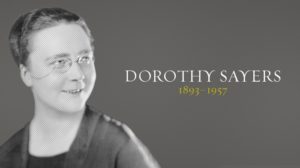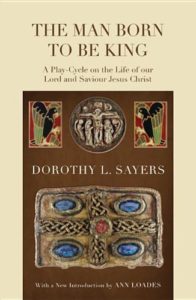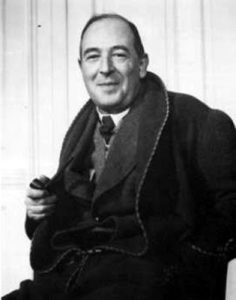This article is by Dr. Alan Snyder
Dorothy Sayers was never present at an Inklings meeting. She was never considered as a member of that weekly sharing of readings and thoughts. Yet she is often seen in conjunction with the Inklings because she graduated from Oxford herself and was friends with two of its leading members: Charles Williams and C. S. Lewis. Lewis, responding during the last year of his life about his connections with Sayers, gave this summary:
Dorothy Sayers, so far as I know, was not even acquainted with any of us except Charles Williams and me. We two had got to know her at different times and in different ways. In my case, the initiative came from her. She was the first person of importance who ever wrote me a fan-letter. I liked her, originally, because she liked me; later, for the extraordinary zest and edge of her conversation—as I like a high wind. She was a friend, not an ally. Needless to say, she never met our own club, and probably never knew of its existence.

Although I have been an avid reader of Lewis my entire life, my only interaction for a long time with anything Sayers wrote was her essay, “The Lost Tools of Learning,” which I read sometime in the early 1990s as I was delving into the movement among homeschoolers to establish a more classical education model. Her explication of the medieval emphasis on the grammar, logic, and rhetoric connected with all subject matter was enlightening.
But there my reading of Sayers stopped until my interest in Lewis led to writing a book on him and awakened a desire to seek out more writers of his ilk.
When the Wade Center’s blog, Off the Shelf, began a short series on one of Sayers’s novels, The Nine Tailors, I was intrigued enough to order the book in an electronic version (my bookcases are already on the verge of succumbing to the inevitable overflow quite common for an academic) to see why it was considered so significant.
I found the novel, which centered on her favorite aristocratic and amateur detective, Lord Peter Wimsey, to be intelligent, suffused with an understated humor, and somewhat different from what I had always considered to be the classic detective story. At the end of the book, there was a teaser for the next one in the series, Gaudy Night, and the teaser worked—I purchased that one as well. In all, I read five of the Wimsey novels and came away impressed with Sayers’s storytelling with a solid emphasis on character development.
 At the same time that Lewis was doing his BBC broadcasts that eventually became Mere Christianity, Sayers had written a series of plays on the life of Jesus that the BBC was also broadcasting. Those plays, The Man Born to Be King, ushered in a major controversy that revolved around her approach to the sacred: she made Jesus, His disciples, and everyone else in the stories speak in the language of the common man in Britain at that time. For some, this was sacrilegious. It was denigrating the person and work of Christ. Sayers, though, held her ground, and the BBC stood with her.
At the same time that Lewis was doing his BBC broadcasts that eventually became Mere Christianity, Sayers had written a series of plays on the life of Jesus that the BBC was also broadcasting. Those plays, The Man Born to Be King, ushered in a major controversy that revolved around her approach to the sacred: she made Jesus, His disciples, and everyone else in the stories speak in the language of the common man in Britain at that time. For some, this was sacrilegious. It was denigrating the person and work of Christ. Sayers, though, held her ground, and the BBC stood with her.
When she turned the plays into a book in 1943, she set out her rationale for what she had done—an apologetic for its appropriateness.
There was a law at that time that had forbidden any representation of the Trinity on the stage (radio plays apparently were thought to be part of “the stage”). That law, she complained, “had helped to foster the notion that all such representations were intrinsically wicked” and led to a “totally heretical Christology which denies the full Humanity of Our Lord.”
She realized she had shattered that tradition “in the face of a good deal of prejudice,” but she had good reasons to do so. “The knowledge which the British public has of the New Testament is extensive,” she admitted, “but in many respects peculiar. The books are, on the whole, far better known as a collection of disjointed texts and moral aphorisms wrenched from their contexts than as a coherent history made up of coherent episodes.” Her plays were an attempt to correct that perception.
Moreover, the words of the books . . . are by great numbers of British Christians held to be sacrosanct in such a sense that they must not be expanded, interpreted, or added to, even in order to set the scene, supply obvious gaps in the narrative, or elucidate the sense. And this sacrosanctity is attributed, not to the Greek of the original and only authentic documents, but to every syllable of a translation made three hundred years ago (and that not always with perfect accuracy) in an idiom so old-fashioned that, even as English, it is often obscure to us or positively misleading.
 Sayers sent Lewis an advance copy of The Man Born to Be King in May 1943, to which he responded, “Thanks awfully! I loved the one I heard on the air . . . and look forward to reading the whole series.” Three days later, he gave her an update: “Have started your book (in bed) but am still in the Preface—very vigorous!” Ten days after that, he had this to report: “I’ve finished The Man Born to be King and think it a complete success.”
Sayers sent Lewis an advance copy of The Man Born to Be King in May 1943, to which he responded, “Thanks awfully! I loved the one I heard on the air . . . and look forward to reading the whole series.” Three days later, he gave her an update: “Have started your book (in bed) but am still in the Preface—very vigorous!” Ten days after that, he had this to report: “I’ve finished The Man Born to be King and think it a complete success.”
Although he questioned her interpretation of Judas, he conceded her conception of him was a valid possibility. Overall, though, he was nothing less than enthusiastic, writing, “I shed real tears (hot ones) in places: since Mauriac’s Vie de Jesus nothing has moved me so much. . . . I expect to read it times without number again.”
Lewis was true to that pledge, letting her know in letters in 1947 and again in 1955 that he was in the process of re-reading it, something that became a sacred ritual for him during Lent.
He also informed an American correspondent in 1949, “I think D. Sayers Man Born to be King has edified us in this country more than anything for a long time.” And what of the critics of Sayers’s approach to the retelling of the gospel story? “I seem to get v. little reading done these days,” he confided to Arthur Greeves in June 1943. But he added, “One thing I have read recently is D. Sayers’ The Man Born to be King wh. I thought excellent, indeed most moving. The objections to it seem to me . . . silly.”
As I finished reading The Man Born to Be King earlier this week, I was struck by how Sayers dealt with betrayal as she has the disciples questioning how their flight away from Jesus during his hour of greatest need affects God. In her words:
Peter: Master—when I disowned you—when we disbelieved and doubted you—when we failed and deserted and betrayed you—is that what we do to God?
Jesus: Yes, Peter.
James: Lord, when they mocked and insulted and spat upon you—when they flogged you—when they howled for your blood—when they nailed you to the cross and killed you—is that what we do to God?
Jesus: Yes, James.
John: Beloved, when you patiently suffered all things, and went down to death with all our sins heaped upon you—is that what God does for us?
Jesus: Yes, John. For you, and with you, and in you, when you are freely mine. For you are not slaves, but sons. Free to be false or faithful, free to reject or confess me, free to crucify God or be crucified with Him, sharing the shame and sorrow, and the bitter cross and the glory.
I was deeply impressed with that passage, as Sayers not only put the episode into the everyday language of the British public, but as she also clearly explained what sin does to God and everything He intended in this world. The sin is pointed out clearly, as is the call to discipleship as the remedy for our failings.
In the eulogy Lewis wrote for Sayers in early 1958, he ended with these thoughtful words: “Let us thank the Author who invented her.”
*
Dr. Alan Snyder is a professor of history at Southeastern University in Lakeland, Florida. He also taught previously at Indiana Wesleyan University, Regent University, and Patrick Henry College. Dr. Snyder has written five books, the latest of which is America Discovers C. S. Lewis: His Profound Impact. Besides Lewis, his teaching specialty is US history, with emphases on spiritual foundations of government and society and modern American intellectual and political conservatism. He comments regularly on Christian faith and government/politics in his blog, Pondering Principles.
This article was reposted from his blog.



Thanks for this – I heartily agree, and find anything and everything of hers I’ve read, worth reading! A fascinating remark of Lewis’s to her is in his letter of 10 December 1945: “Although you have so little time to write letters, you are one of the great English letter writers. (Awful vision for you -“It is often forgotten that Miss Sayers was known in her own day as an Author. We who have been familiar from childhood with the Letters can hardly realise!…”).” I’ve only caught up with the second volume of her Letters, so far, but it leaves me wanting to read all of them!
As far as I know, her radio plays are among the many of which, sadly, no original recordings survive. It would be delightful if someone made audiobook versions as fine as those by Ian Carmichael of her Wimsey stories!